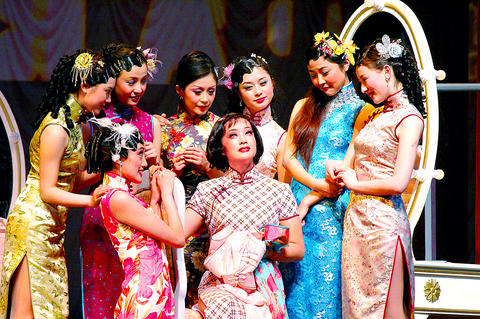The mood at the premiere of The Last Night of Taipan Chin (金大班的最後一夜) was one of nostalgia for a bygone era. This was fortunate, as nostalgia is a forgiving emotion, and the show, which had been much hyped due to the starring role played by Liu Xiaoqing (劉曉慶), only managed to sustain itself on the good will of the audience.
The premiere was a star-studded affair, with the elderly Morris Chang (張忠謀), chairman of TSMC, and his wife, Taipei mayor Hau Lung-bin (郝龍斌) accompanying his father Hau Pei-tsun (郝柏村), socialite Amy Ho (何麗玲) and model Lin Chi-ling (林志玲) courting the cameras that were lined outside the Sun Yat-sen Memorial Hall. It was a big night out for the movers and shakers, who dutifully applauded the plodding performance in which only Liu ever shone, and then only sporadically. The presentation was very dated, and the evocation of a hot and steaming sex scene through the medium of contemporary dance was simply laughable. There was a badly rehearsed can-can line and some exceeding pedestrian ballroom dancing, but worst of all was the fact that the music was never really allowed to come into its own. It was simply, like Liu herself, a gimmick on which to sell the show.
The greatest culprit in the whole sad presentation was the sound system and the appalling acoustics of the Sun Yat-sen Memorial Hall auditorium. Actors spoke with disembodied voices, hiss was a constant irritant in the background, and the volume control was erratic. The lighting technician could also have done with a bit more practice and scene changes could have been a little more expeditious. The rotating stage set up made so much noise when turning that one feared it might come to a shuddering halt at any moment.

PHOTO: COURTESY OF NEW ASPECT
For such a big ticket performance, these technical problems were inexcusable and the management of the auditorium should be utterly ashamed of itself. But ultimately, the greatest failing of The Last Night of Taipan Chin was that it pinned everything on its star, and while she certainly cut an attractive figure among the bumbling cast, her presence was never strong enough to hold up the precarious edifice of this musical drama.
The performance can still be seen at 7:30pm tonight through to Wednesday at the Sun Yat-sen Memorial Hall (國父紀念館) at 505, Renai Rd Sec 4, Taipei City (台北市仁愛路四段505號). Tickets are available through NTCH ticketing.
The Gemini Trio thrilled audiences last night with classical music that surveyed the early and late romantic period, South American Tango and an encore that included Taiwanese compositions. Consisting of Benjamin C. Meyers on cello, Taiwanese Wang Hsiu-hui (王琇慧) on piano and Wang Sheng-tsung (王聖琮) on violin, the trio left the audience on its feet clapping for more. Billed as the Gemini Piano Trio - Homecoming Concert 2008 (美國雙子星鋼琴三重奏2008回到故鄉), their reading of Beethoven's Piano Trio in D Major showed maturity and discipline beyond their years while the Astor Piazolla/Jose Bragato Three Tangos for Piano Trio epitomized the idiom of chamber music. Dvorak's Piano Trio in E Minor, revealed how each musician is a virtuoso in their own right with Wang Hsiu-hui jumping across the keyboard and complimenting the succinct bowing of Meyers and Wang Sheng-tsung. Of particular note were Meyer and Wang Sheng-tsung's presence on the stage (Wang Hsiu-hui was, unfortunately, obscured by the string players).
The Gemini Piano Trio's final Taiwan performance is tonight at Chang Jung University Convention Hall (長榮大學國際會議廳) 396, Changjung St Sec 1, Gueiren Township, Tainan County (台南縣歸仁鄉長榮路一段396號). The concert is free.

April 28 to May 4 During the Japanese colonial era, a city’s “first” high school typically served Japanese students, while Taiwanese attended the “second” high school. Only in Taichung was this reversed. That’s because when Taichung First High School opened its doors on May 1, 1915 to serve Taiwanese students who were previously barred from secondary education, it was the only high school in town. Former principal Hideo Azukisawa threatened to quit when the government in 1922 attempted to transfer the “first” designation to a new local high school for Japanese students, leading to this unusual situation. Prior to the Taichung First

The Ministry of Education last month proposed a nationwide ban on mobile devices in schools, aiming to curb concerns over student phone addiction. Under the revised regulation, which will take effect in August, teachers and schools will be required to collect mobile devices — including phones, laptops and wearables devices — for safekeeping during school hours, unless they are being used for educational purposes. For Chang Fong-ching (張鳳琴), the ban will have a positive impact. “It’s a good move,” says the professor in the department of

On April 17, Chinese Nationalist Party (KMT) Chairman Eric Chu (朱立倫) launched a bold campaign to revive and revitalize the KMT base by calling for an impromptu rally at the Taipei prosecutor’s offices to protest recent arrests of KMT recall campaigners over allegations of forgery and fraud involving signatures of dead voters. The protest had no time to apply for permits and was illegal, but that played into the sense of opposition grievance at alleged weaponization of the judiciary by the Democratic Progressive Party (DPP) to “annihilate” the opposition parties. Blamed for faltering recall campaigns and faced with a KMT chair

Article 2 of the Additional Articles of the Constitution of the Republic of China (中華民國憲法增修條文) stipulates that upon a vote of no confidence in the premier, the president can dissolve the legislature within 10 days. If the legislature is dissolved, a new legislative election must be held within 60 days, and the legislators’ terms will then be reckoned from that election. Two weeks ago Taipei Mayor Chiang Wan-an (蔣萬安) of the Chinese Nationalist Party (KMT) proposed that the legislature hold a vote of no confidence in the premier and dare the president to dissolve the legislature. The legislature is currently controlled